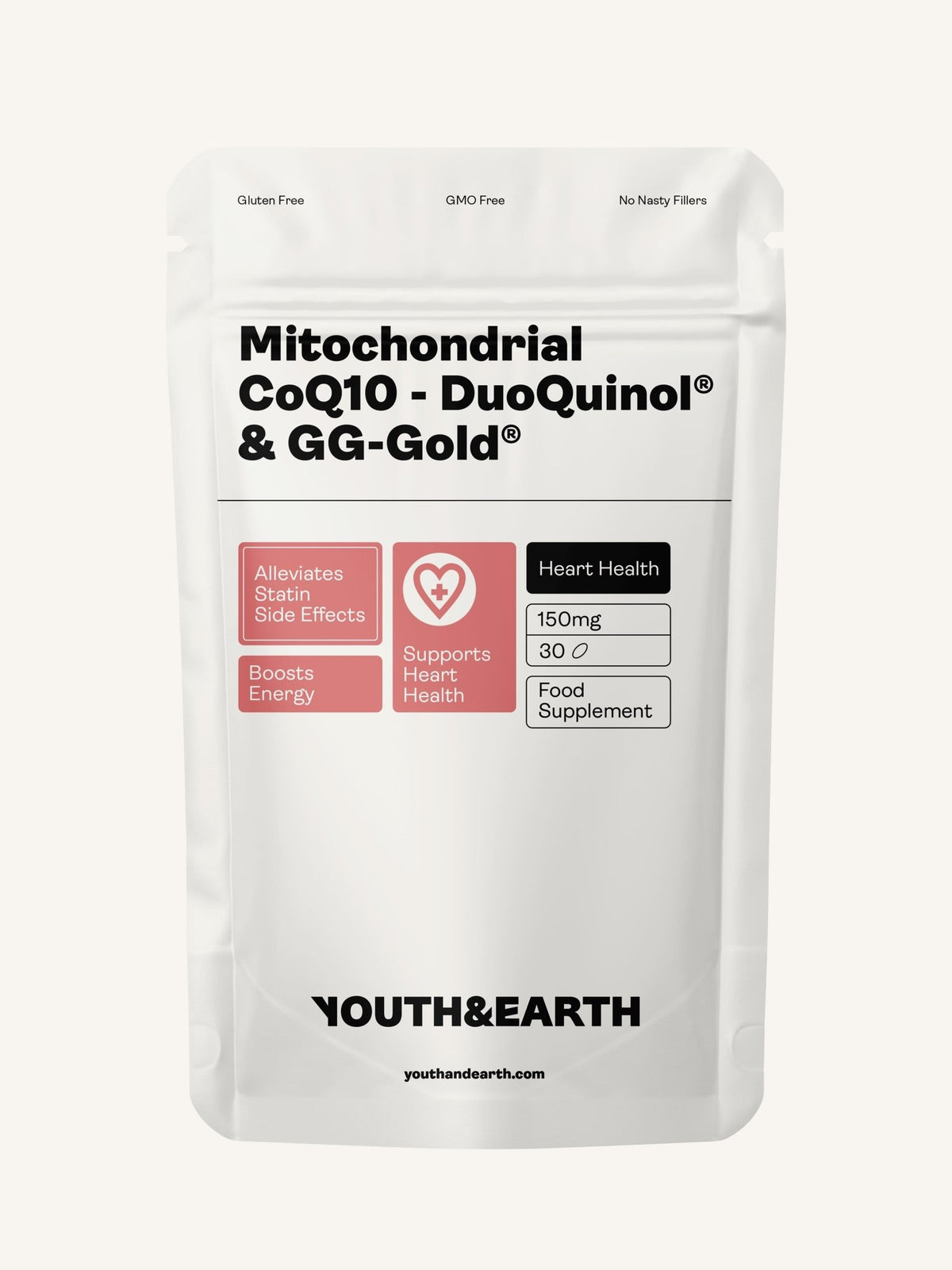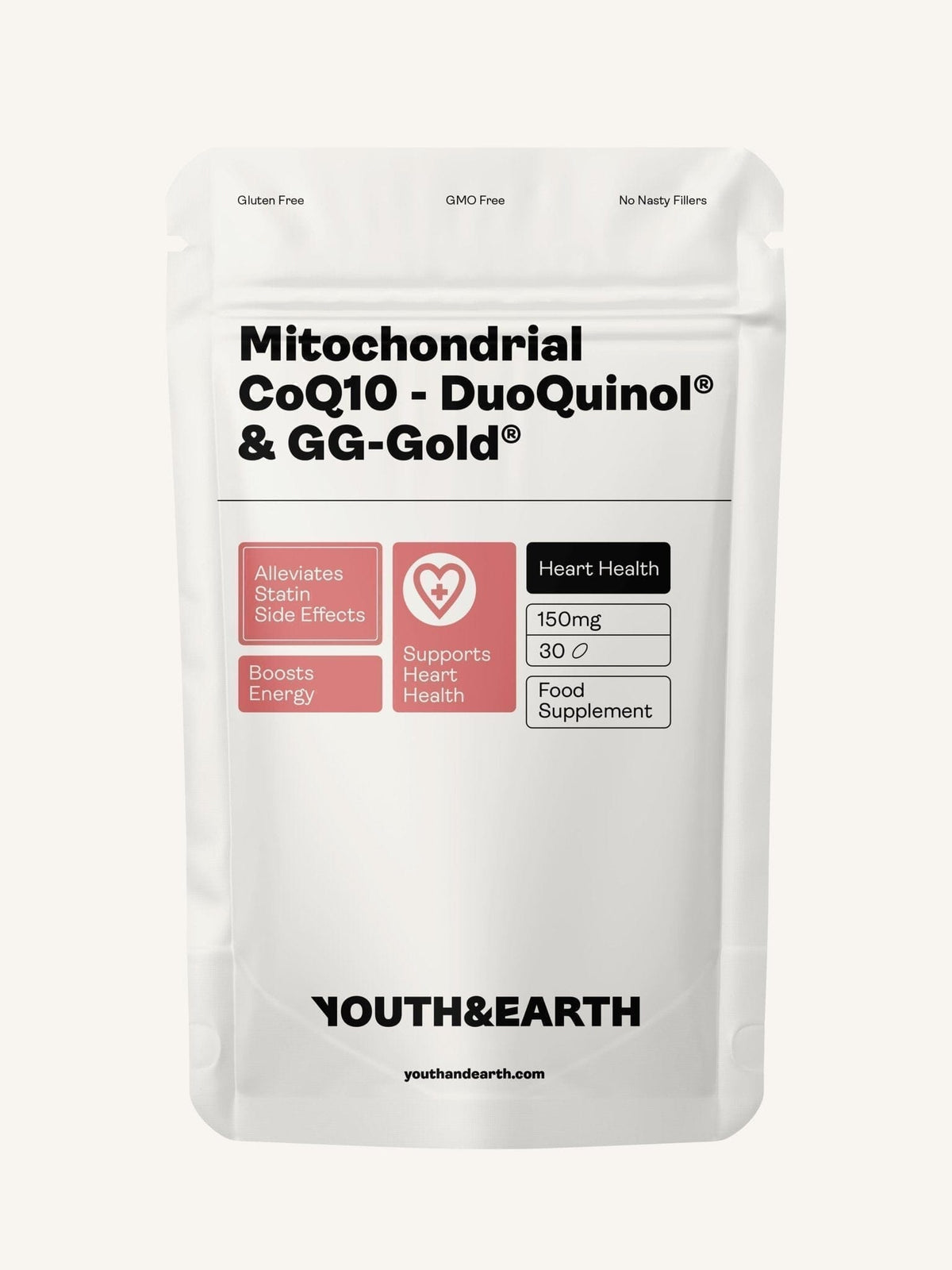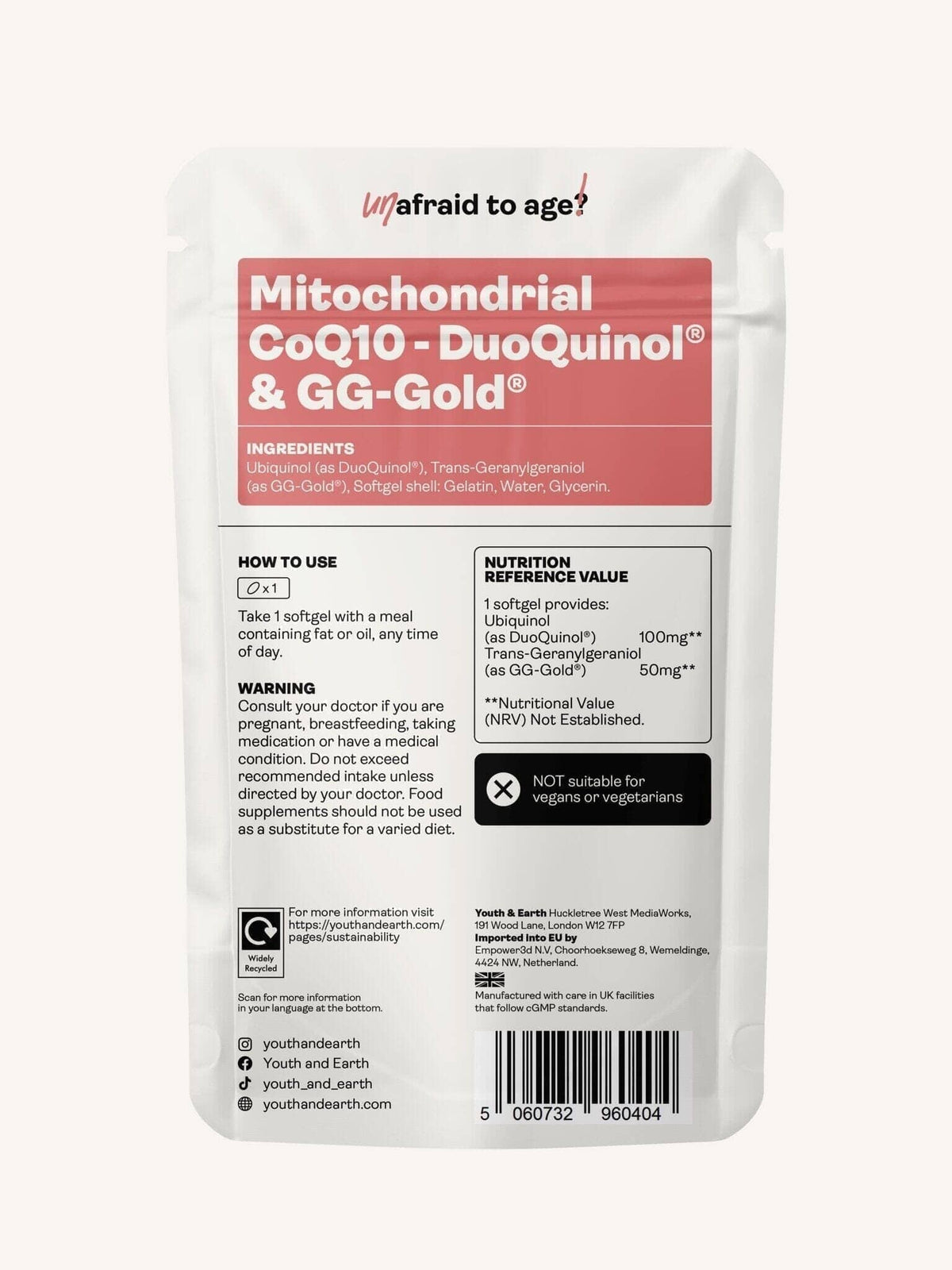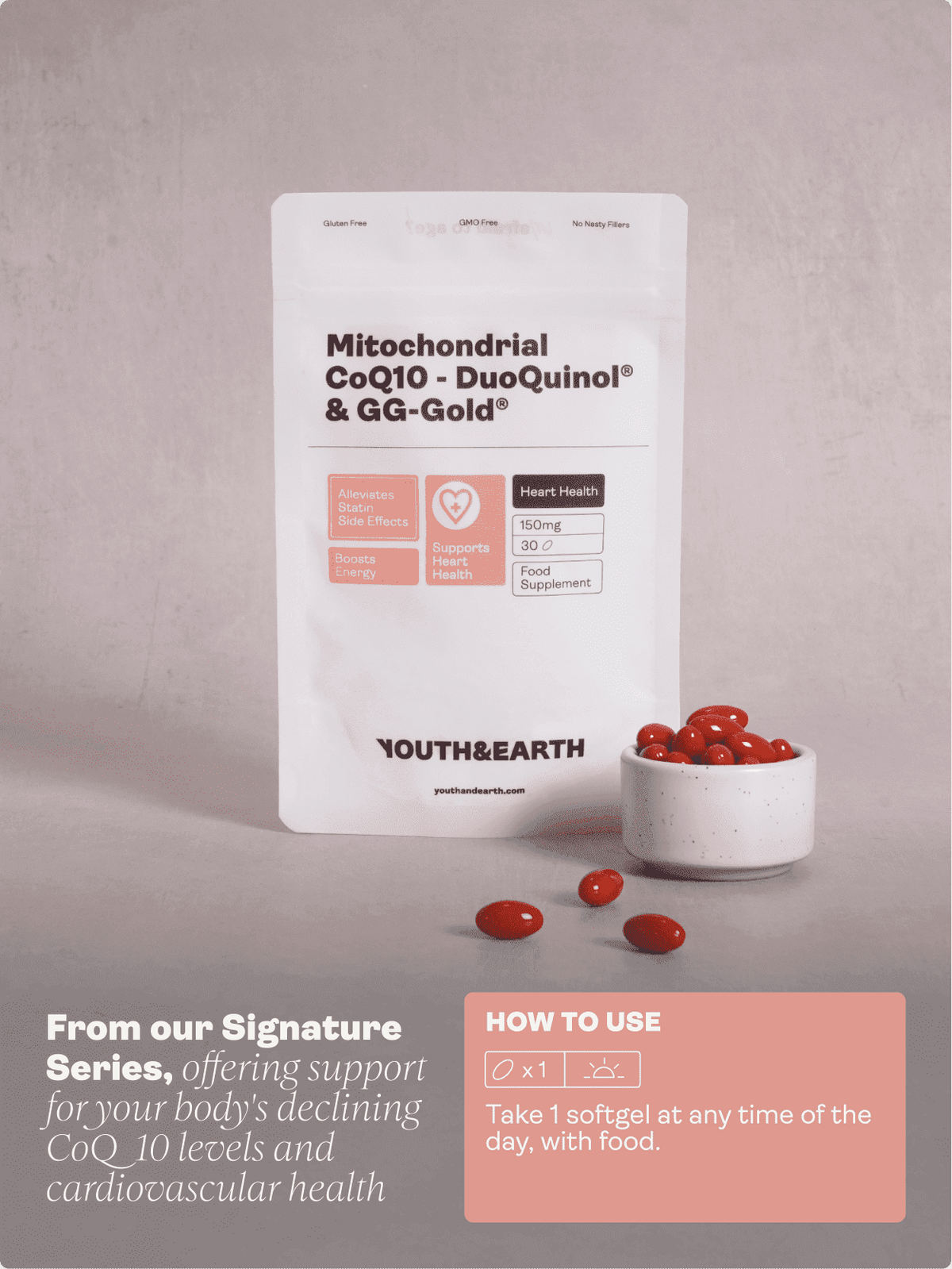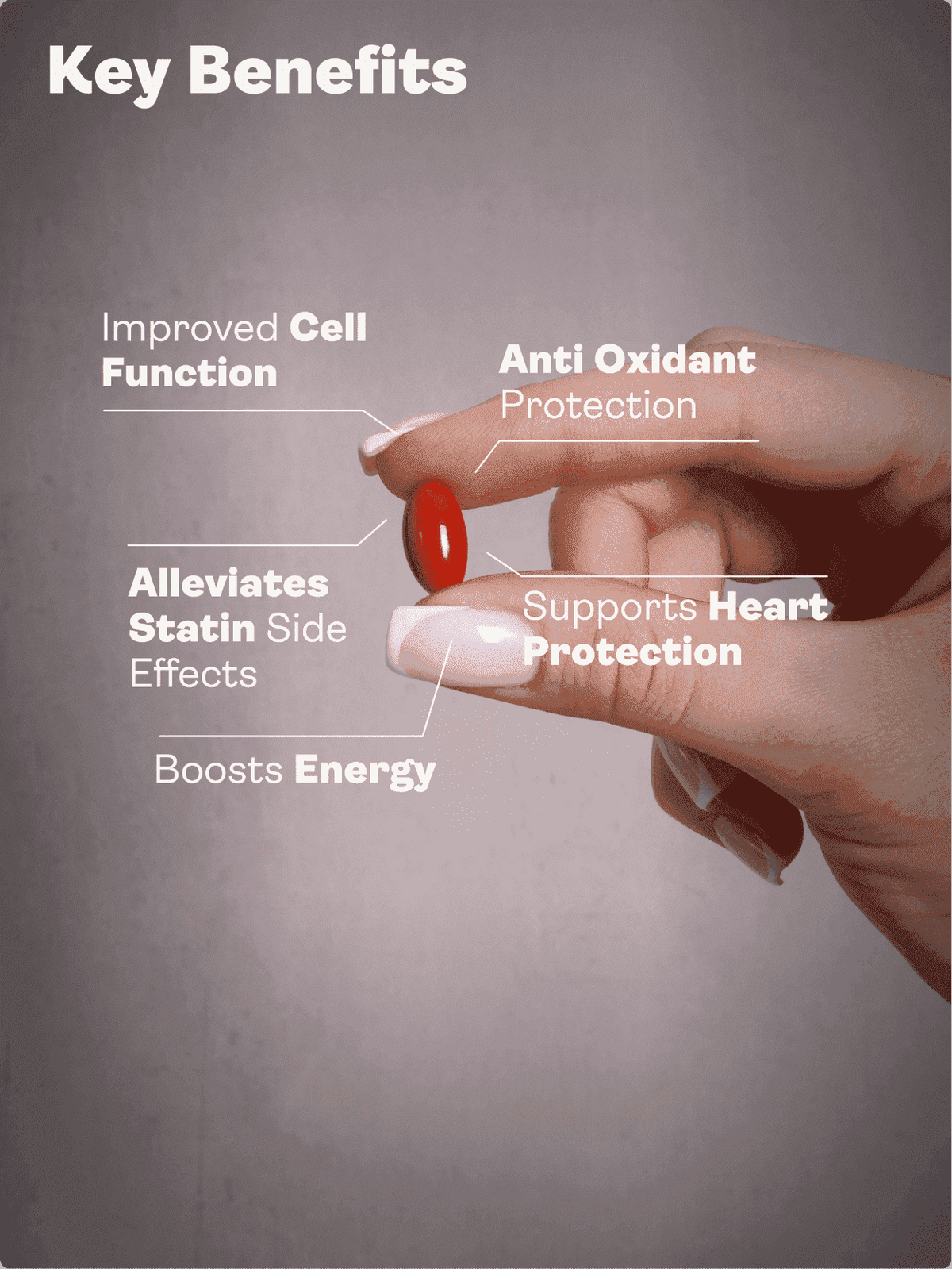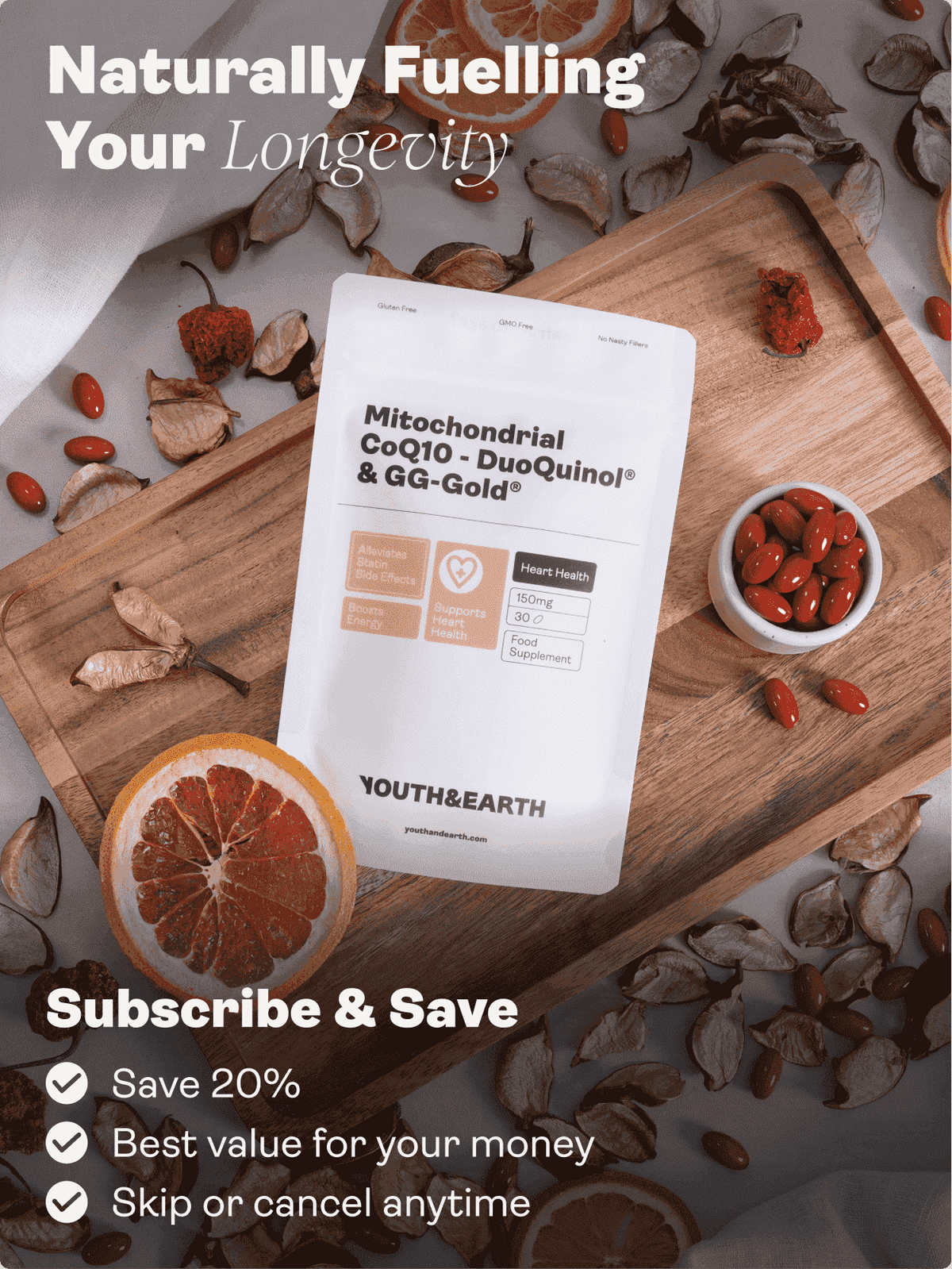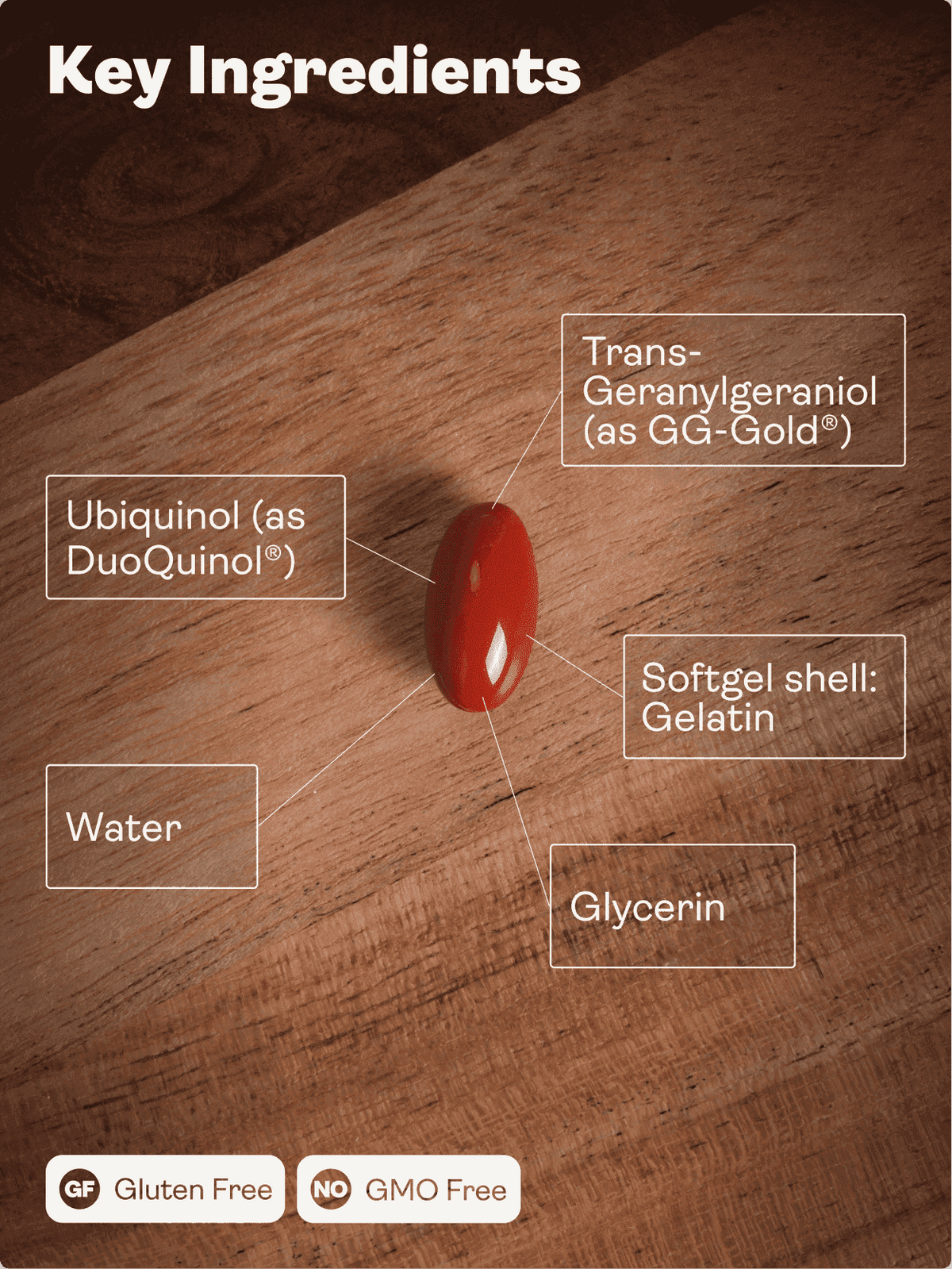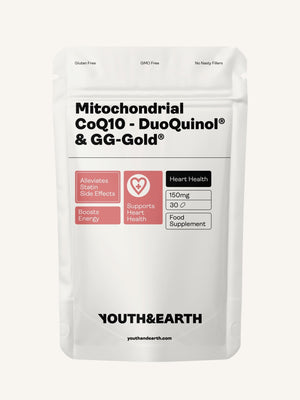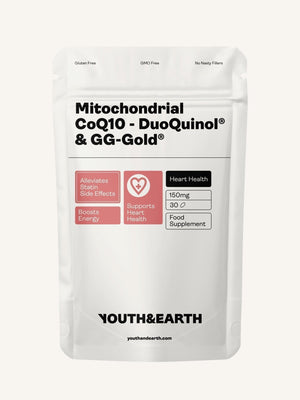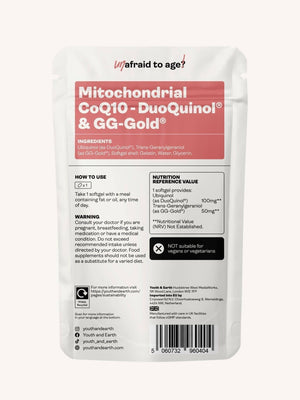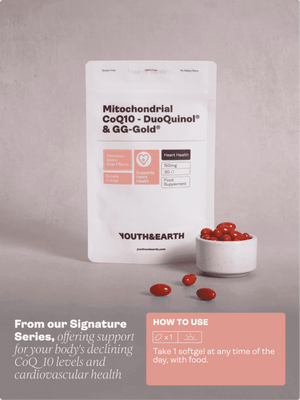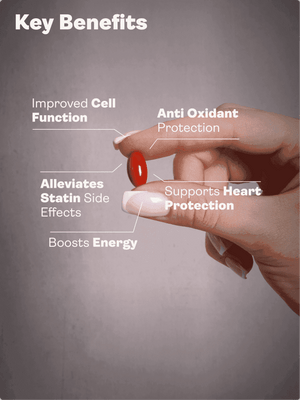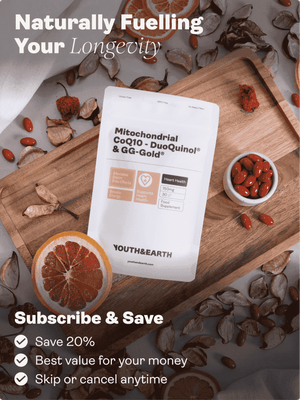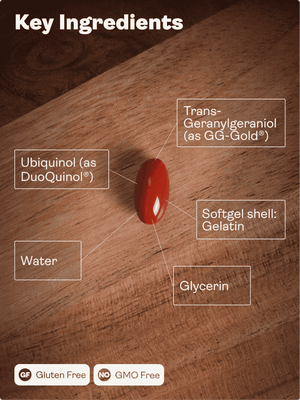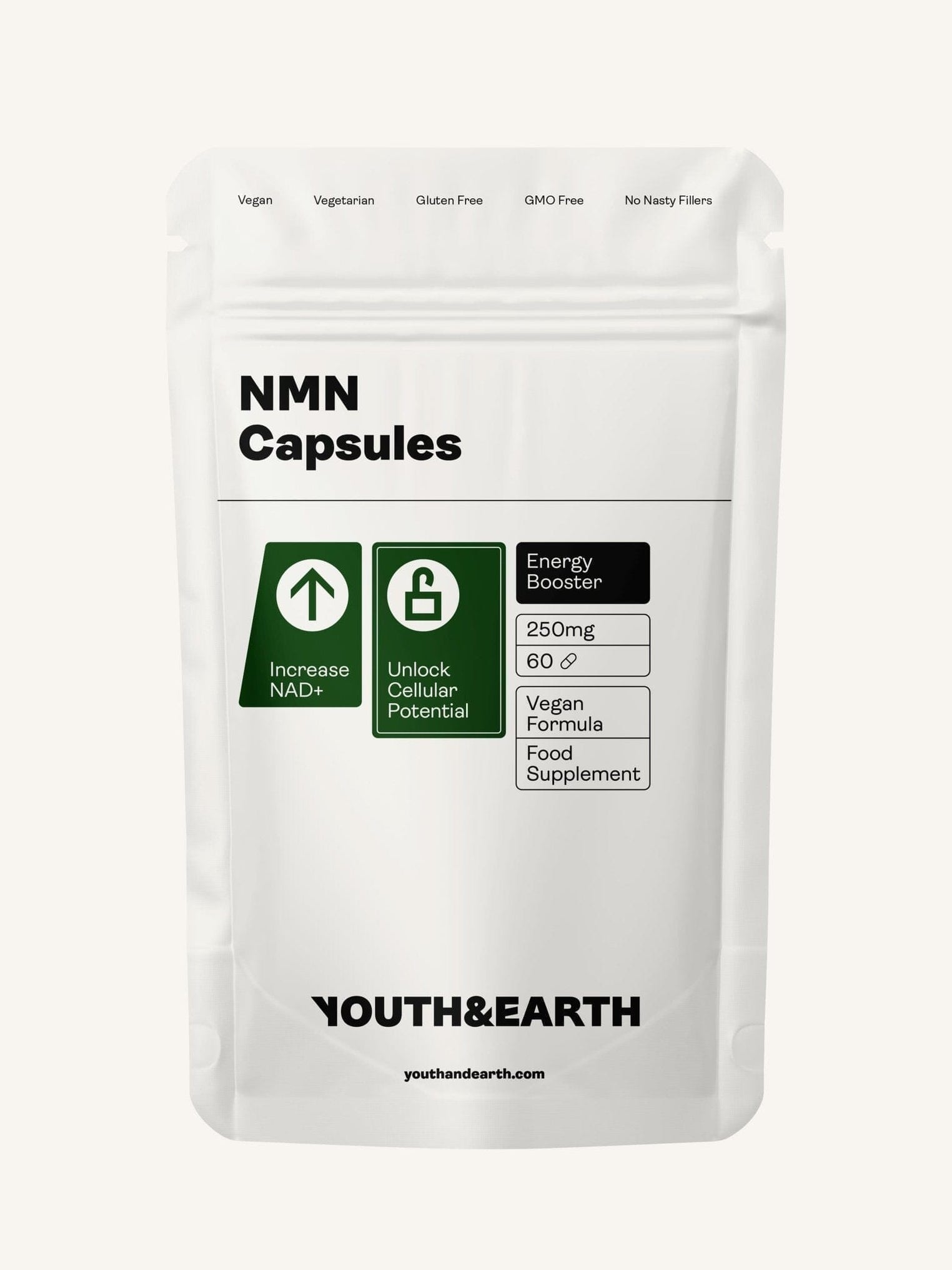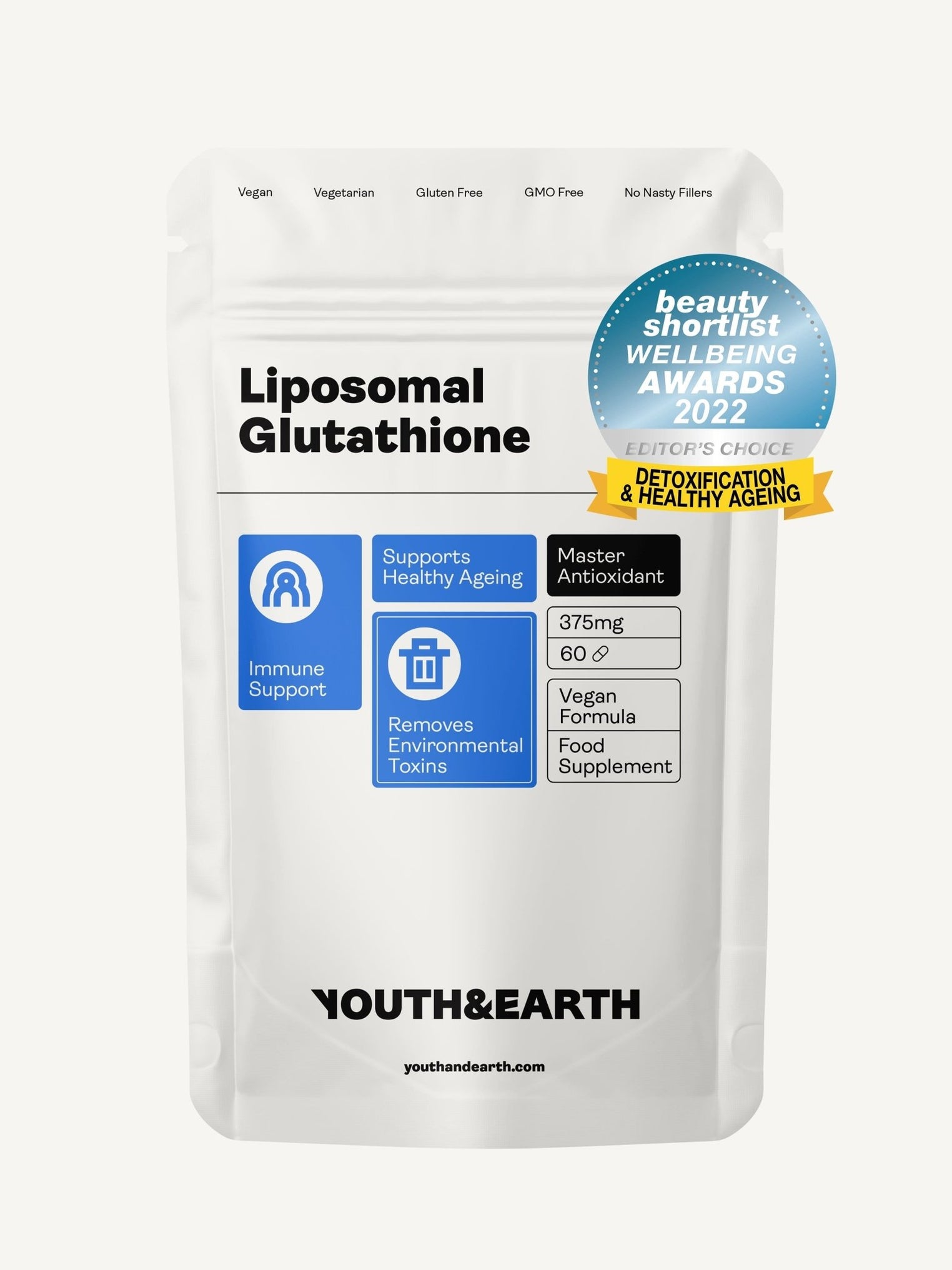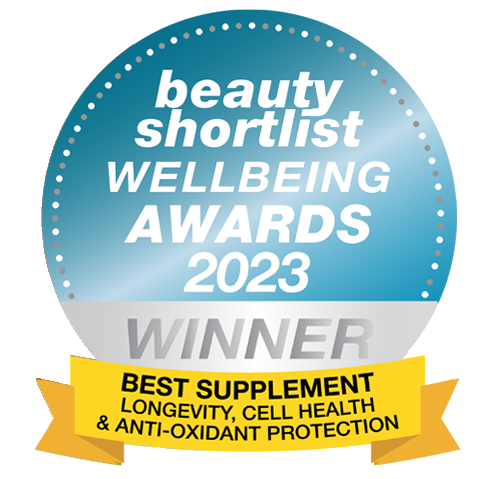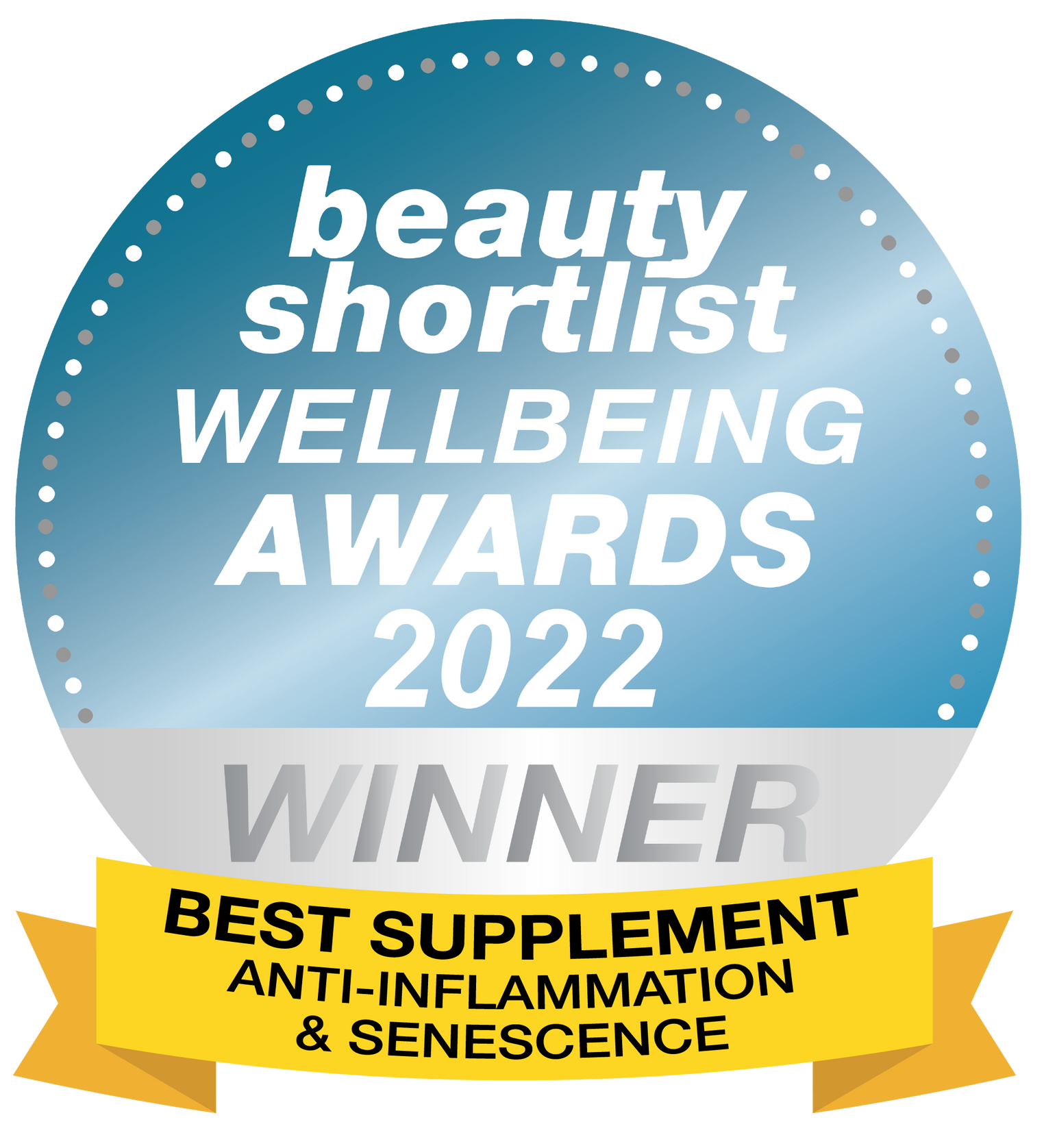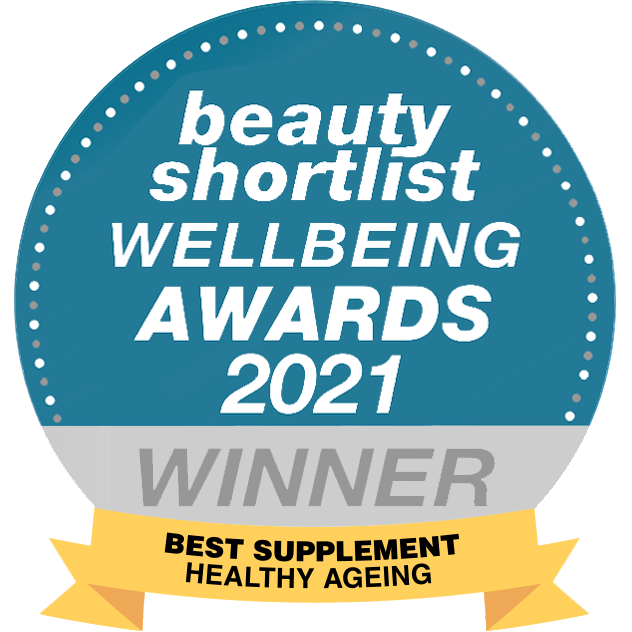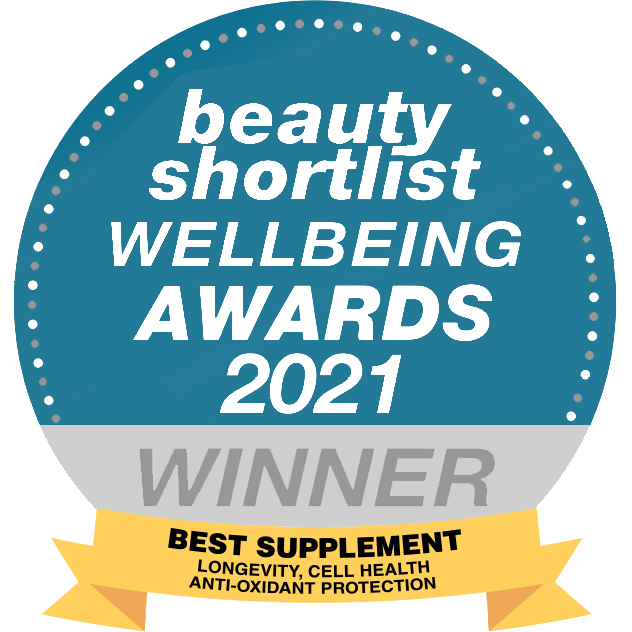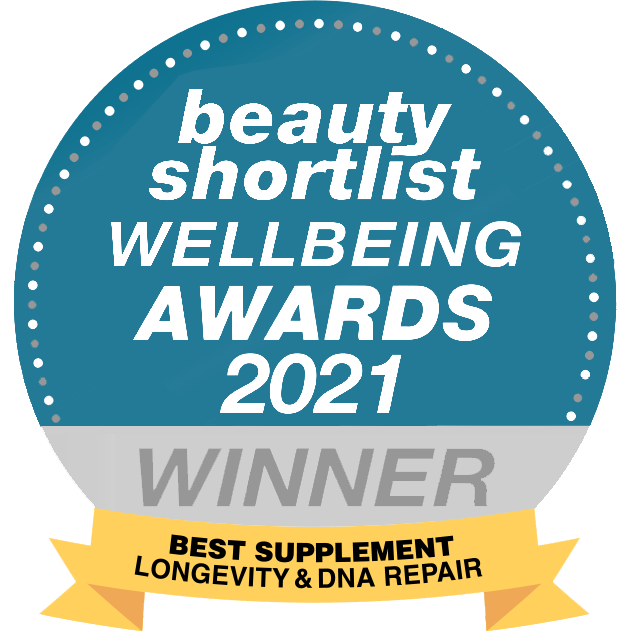Coenzyme Q10 (CoQ10) is a critical compound in cell energy production. It’s made by your body but, as you age, less is produced. Find out why CoQ10 is essential to slow down the aging process and how you can boost its levels.
Have you ever stopped to imagine the thousands of biochemical processes that take place in your body every single minute? For most of us, we pass through life blissfully unaware of all that goes on in the cells of our bodies.
However, to feel younger for longer, it’s important to understand how some of these processes work so that you can support your body properly as it ages. For example, did you know that there are crucial enzymatic processes that are responsible for generating the energy in our bodies and that these have a direct influence on our health and the aging process?
In this article, we’ll be looking at a particular coenzyme that’s popular in the world of anti-aging and health: coenzyme Q10. We’ll briefly cover what it does, why it’s important, and how you can go about supplementing with CoQ10 to keep your energy levels high.
What is Q10?
Our cells and all the processes in our bodies rely on chemical reactions. For example, a large part of the process that converts food into energy is a chemical one. The molecules that cause and govern these reactions are called enzymes. Enzymes are protein molecules that are either located within organelles within the cell or are floating about in the cell body itself.
Coenzymes are a family of organic non-protein molecules that help enzymes to catalyze and control reactions. They achieve this by binding to the enzyme at a specific site that activates it and helps the enzyme cause the reaction. Biochemically speaking, without coenzymes, there would be fewer if any reactions that would take place in the body.
Coenzyme Q10 belongs to a family of coenzymes known as coenzyme Q or ubiquinone and is mostly found in human cells. The rest of the family members (6 of them) are found in animals and bacteria.
CoQ10 is stored in the mitochondria, the energy powerhouse of the cell. The greatest quantities of this coenzyme are found in the liver, heart, brain, muscles, and kidneys. It’s also soluble in lipids which allows it to easily pass through the cell membrane and the outer and inner membranes of the mitochondria.
Coenzyme Q10 Uses, & Benefits
Coenzyme Q10 plays an essential role in helping our bodies produce and regulate energy. Most of the cells in our body require sufficient energy to function properly which is why CoQ10 is so critical.
It’s also a very important lipid antioxidant that prevents our bodies from generating excess free radicals and modifying DNA, lipids, and proteins. It protects and supports the mitochondria that produce the energy that our cells need.
In a nutshell, supplementing with coenzyme Q10 will not only improve the functioning of your mitochondria, it will also protect them and your body’s tissues and organs.
CoQ10 Generate Energy - How?
To understand how CoQ10 works, we’ll have to briefly look at glycolysis (how glucose is broken down) and the electron-transport chain processes.
Glycolysis
Glycolysis is a metabolic pathway that consists of 10 reactions all occurring in the cytoplasm of a cell. The cytoplasm is the liquid inside the cell, a bit like the egg white in an egg. The reactions break down glucose molecules from nutrients to produce an organic compound called adenosine triphosphate (ATP).
ATP provides the energy that cells need to power processes such as chemical synthesis, contraction of muscles, and propagation of nerve impulses.
Glycolysis occurs in two phases:
-
Energy investment phase: In this phase, the body “invests” the energy from 2 ATP molecules to split a glucose molecule in half.
-
Energy payoff phase: The 2 halves of the glucose molecule are then oxidized to produce 2 pyruvate molecules (important chemical compounds). In the process, 4 ATP molecules are produced and 2 molecules of NAD+ that is reduced to NADH.
The pyruvate molecules are then carried into the mitochondria by special pyruvate carriers. While there, they undergo oxidation to produce Acetyl Coenzyme A, NADH, flavin adenine dinucleotide (FADH2), and carbon dioxide.
The NADH generated in the cytoplasm must be transported across the inner membrane of the mitochondria to the matrix (part of the mitochondria that produces energy and performs other functions). Unfortunately, the membrane is impermeable to both NAD+ and NADH. For this reason, electrons from NADH must be carried across the membrane to the matrix through a process called the electron transport chain.
The Electron Transport Chain (ETC)
The ETC has four complexes that involve the transfer of electrons from NADH through the inner membrane of the mitochondria into the matrix to produce ATP. This chain is very important because it produces 95% of the cell’s energy.
Coenzyme Q10 has a vital role to play in making sure that the electrons are transported across and that ATP is formed. Without enough CoQ10, there would be less ATP produced in our cells which has a negative effect on cell function and, eventually, our health.
Is coenzyme Q10 anti-aging?
Yes, coenzyme Q10 plays a very important role in preventing early aging. Without it, our cells would lose the ability to produce energy and the antioxidant protection that it offers.
In addition, although our bodies can synthesize coenzyme Q10 naturally, in a 2019 study, published in the National Center for Biotechnology Information (NCBI), it was shown that as you age, your levels of CoQ10 tend to fall. In fact, many chronic conditions associated with aging have been linked to low levels of this coenzyme.
By boosting the levels of this enzyme, you can potentially slow down or even prevent these conditions and the deterioration that’s associated with growing older. Therefore, CoQ10 is very much anti-aging.
Are there benefits to taking coenzyme Q10 supplements?
Yes, numerous studies have been done on CoQ10 and its effect on various conditions. Here are some of the possible benefits that have been found. Research into this essential antioxidant is ongoing.
CoQ10 may improve the symptoms of those who suffer from heart failure
Heart failure occurs when the heart muscles are unable to contract or relax enough to pump blood. The cardiac muscle tissue consists of cells such as cardiomyocytes, smooth muscle cells, and fibroblasts. These cells use ATP from their mitochondria to power their contraction. In a study involving heart failure patients, administering coenzyme Q10 improved their symptoms.
It might improve exercise performance
Oxidative stress and dysfunctional mitochondria can limit your ability to exercise. Without enough levels of cell energy, muscles cannot contract to sustain a workout. Coenzyme Q10 plays both roles, as an antioxidant and a critical component in cell energy production. In a 2010 study, it was shown that supplementing with coenzyme Q10 helped to reduce oxidative stress and increased power during exercise.
It may help regulate blood sugar levels
There is a strong link between dysfunctional mitochondria and insulin resistance. In a 2014 study, patients with type 2 diabetes supplemented with CoQ10 for 12 weeks. The result was reduced blood sugar levels with notable decreases in hemoglobin A1c and fasting blood sugar levels.
If you’re struggling with blood sugar levels, read: Berberine the Super Antioxidant
Coenzyme Q10 may help minimize the signs of aging
Free radicals on the skin tissue from environmental and cellular entities, cause oxidative stress. If unchecked, this can damage your skin. CoQ10 is a powerful antioxidant. Topical treatments containing CoQ10 are normally applied to counter the oxidative stress and ramp up skin cell energy production, keeping your skin looking youthful and healthy.
Our product Injuv is an all-natural moisturizer that improves your skin and the signs of aging from the inside.
CoQ10 may help protect the lungs
As mentioned, this coenzyme is a powerful antioxidant that plays an important role in minimizing damage caused by oxidation.
Chronic lung conditions, such as Chronic Obstructive Pulmonary Disease (COPD), are linked to oxidative damage and low levels of coenzyme Q10 in the lungs. Research indicates that supplementing with this coenzyme may help ease some of the symptoms associated with these conditions.
Coenzyme Q10 may also help with migraines and statin side effects
Other studies also indicate that CoQ10 has the potential to reduce and possibly prevent migraines. Researchers think that this may be because it keeps the mitochondria in the brain cells healthy.
There are also indications that CoQ10 may help with muscle weakness and possibly manage pain associated with using statins.
Can you get coenzyme Q10 from food?
Yes, you can get coenzyme Q10 from food, however, they only contribute 25% of what the body needs and will not significantly increase CoQ10 levels in the body. On average, the intake of CoQ10 through diet is about 3 to 6 mg/day. This makes supplements the go-to option for boosting tissue CoQ10 concentrations.
Foods that contain coenzyme Q10 include:
-
Organ meats: Such as heart, kidney, and liver.
-
Muscle meat: Like chicken,beef, and pork.
-
Fatty fish: Like sardine, herring, mackerel, and trout.
-
Vegetables: Like spinach, cauliflower, and broccoli.
-
Legumes: Soybeans, peanuts, and lentils.
Is CoQ10 worth taking?
Yes, because of the critical role that CoQ10 plays in energy production and health, and the fact that levels decrease with age, it’s worth supplementing with this enzyme. If you find that you are struggling with chronic tiredness, fatigue, brain fog, and sluggish brain function, you will benefit from supplementing with coenzyme Q10.
However, there is a problem with traditional supplements. When administered orally, only 5% of CoQ10 makes it to the circulation system because of the digestive system. Patients with a deficiency of this coenzyme need much higher pharmacological doses and traditional delivery methods might not be that effective.
However, thanks to technology, new delivery methods such as liposomal supplements can deliver nutrients directly into the cell which enhances the bioavailability and benefits of supplementing with CoQ10.
To find out more about liposomal delivery, read: What are Liposomal Supplements and How Do They Work?
Conclusion
Coenzyme Q10 is at the center of most crucial biochemical processes. It plays a key role in the electron transport chain thus facilitating the production of cell energy. Extremely low levels of coenzyme Q10 can have disastrous effects on your body and have been linked to many of the chronic conditions associated with aging.
Oxidative stress which takes a toll on most organs in your body including the skin, can destroy your cells, and accelerate aging and death. Coenzyme 10 health benefits are cross-cutting from the brain to the nervous system to the cardiac muscles and even the lungs.
While the body naturally synthesizes CoQ10, age slows down the process. The second source of the coenzyme is food. However, this doesn’t contribute much either. If you want to boost your CoQ10 levels to look younger for longer and slow down aging, consider supplementing with liposomal coenzyme Q10.
The content of this article is for informational purposes only. It’s not intended to be a substitute for professional medical advice, diagnosis, or treatment. Always seek the advice of your physician or health provider before starting a new health regime or program. Do not ignore medical advice or delay seeking it because of something you’ve read on this site or any Youth & Earth product.














